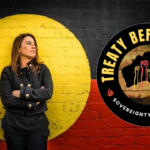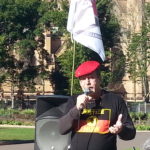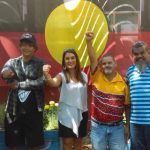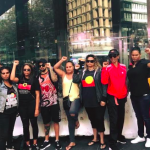Blak Greens Advise Opposing, as Truth and Treaty Must Come Before Voice
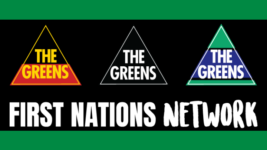
The Australian Greens First Nations Network (AG-FNN) has publicly released its official position on the Voice referendum. And the statement maintains the network’s long-held stance on the advisory body, which leads it to encourage members to vote no in the national poll.
The AG-FNN convened a meeting in September to produce its position statement. And this was distributed amongst its wider network, also referred to as the Blak Greens, for further consideration and the since amended 2 October released statement reflects a consensus position.
The network underscores in its first lines that it respects and acknowledges the right of all to “self-determine their vote in the referendum”, however it thought it necessary to provide its perspective, as it is the representational body “of First Nations members of the Australian Greens”.
And the Blak Green’s position on the proposed constitutionally-enshrined Indigenous Voice to Parliament remains its 2020-established policy Truth, Treaty and Voice (TTV), which went on to be taken up by the broader Australian Greens party at its national conference.
The TTV position was developed using the three elements identified in the 2017 Statement from the Heart – voice, treaty, truth – and it reverses their order, as it warns that to initially establish to a voice, with no prior groundwork being undertaken, is to risk simply preserving the status quo.
Limiting the debate
“We acknowledge that there is a diversity of views around the Voice and that the Labor Party has divided people,” states the AG-FNN. “We are committed to working with all First Nations peoples regardless of what position they take on the referendum.”
“It is a fact that Labor’s voice does not align with Green’s policy on Truth, Treaty, Voice, which clearly states an order and that the voice must be subject to treaty negotiations.”
Right now, there is little truth surrounding the public debate about the Voice, as politicians and the media have polarised the nation into two distinct camps: the No and Yes votes. So, positions divergent to these are taken not to exist, and the entire future is said to depend on this one vote.
Broadly speaking, the No campaign frames the Voice as an all-powerful body that will provide undue benefits to First Nations peoples and divide the nation, whilst Yes maintains that the nonbinding advisory body will eradicate the disparities First Peoples face, despite it being denied direct power.
But a third position, often referred to as the Progressive No vote, which is the one being advanced by the Blak Greens, asserts the Voice proposal provides no self-determination to First Nations, but instead, will enshrine their subordinate position to government in the nation’s founding document.
This third position has been all but erased from the official debate, even though it represents the most prominent self-determining political position First Nations peoples have been arguing for going back decades. And it’s resulted in the absurd labelling of those who hold this position as racists.
“There can be no progress or healing until everyone who lives on this land learns, accepts and acts on the truth of what continued settler colonialism means for First Nations people,” the AG-FNN position statement makes clear.
Truth-telling
But what truth-telling needs to be established? And why would any such truths have an effect on a body like the Aboriginal and Torres Strait Islander Voice to Parliament?
Well, a hell of a lot of lies were behind the invasion, take over and established occupation of so-called Australia.
There was the legal fiction of terra nullius, which conveyed that the land was empty of any humans who possessed any distinct links to it. And another pervasive myth has been that First Nations peoples simply moved off their lands and allowed for peaceful British colonisation.
At the time of federation, First Nations peoples were deliberately not placed in the Australian Constitution, and neither was a bill of rights to cover all citizens, as the drafters were concerned that such protections could affect existing laws that discriminated against Aboriginal and Chinese people.
From federation in 1901 until the 1970s, the great Australian silence took place. This consisted of writing First Nations peoples out of the history books, which served to deny their present and past existence. And it wiped the Frontier Wars from settler consciousness, whilst preserving terra nullius.
Federation took place mid-Protection era, which lasted for a century commencing in the 1860s. It saw Aboriginal people moved off their land and placed in camps, where police controlled their lives, while certain kids were placed in boarding schools and others were made domestic servants.
Coinciding with this attempted erasure of the First Peoples, the newly-minted Australian parliament set out passing a series of laws, collectively known as the White Australia policy, which served to create and preserve the myth of a white Australia, whilst banning nonwhite immigration.
By the time black armband white historians began revisiting the Frontier Wars in the 1970s, it was well established in the settler colonial mind that there was a population of Aboriginal people who were to be blamed for their own poverty, as the true causes had been erased from the histories.
Of course, First Nations people always retained the knowledge of what had really been transpiring on the continent, but they remain 3 percent of voters at the coming referendum, while the overwhelming majority will go to the polls prior to any nationwide reckoning involving these lies.
“So much of the rhetoric surrounding the Voice referendum is racist, and we want to emphasise that it is for this reason that Truth-telling and Treaty must occur before the Voice,” the Blak Greens maintain in their statement.
Why oppose?
The AG-FNN outlines a long list of reasons to deny the Voice, which includes it not guaranteeing First Nations sovereignty won’t be impacted, and neither is there any guarantee that treaty and truth-telling will be progressed in its wake.
Inserting First Nations peoples into the Australian Constitution in this manner does place them in a hierarchy with the Crown and government above them, which is an act that will further serve to assimilate Aboriginal and Torres Strait Islander peoples into the broader colonial project.
And whilst that hierarchy will be established in the nation’s founding document, prior to any resolutions made via a truth-telling process, it will further create a body that can advise, but has no real power or authority, and there will be no proviso that its advice must even be considered.
The Blak Greens further explain that while Labor claims that sovereignty won’t be ceded through constitutional recognition, an amendment to the referendum legislation that would have explicitly guaranteed this, which was proposed by Senator Lidia Thorpe, was voted down by the entire Senate.
Not the be all and end all
Instead of voting for the Voice, you should demand the government implement the recommendations from both the 1991 Royal Commission into Aboriginal Deaths in Custody and the 1997 Bringing Them Home Report, the AG-FNN further suggests in its statement.
Indeed, the point has been made that these official, in-depth, government-funded inquiries resulted in multiple recommendations creating clear paths to prevent custodial deaths and child removals, but they’ve then been ignored for the most part, so why would the Voice be any different?
Then PM John Howard first put the concept of constitutional recognition on the table in October 2007. However, the month prior, had seen his government as one of four nations that voted against adopting the United Nations Declaration on the Rights of Indigenous Peoples (the UNDRIP).
The UNDRIP upholds the universal rights of Indigenous peoples. Yet, the Howard government resisted progress in terms of First Nations rights to self-determination, and instead a month later, became very concerned with incorporating the First Peoples of this continent into the Constitution.
The Blak Greens statement further doesn’t just oppose the Voice, but it provides an alternative to it, which is treatymaking. This process would involve negotiations between two recognised sovereign parties to establish just terms around rights and custodianship of lands and waters.
“There has been and will continue to be a failure to protect First Nations peoples as long as the government fails to have a treaty with the people it genocided,” the Australian Greens First Nations Network warns in conclusion.
“Despite all this, we are expected to praise them for offering us a concession in the form of Labor’s Voice to Parliament.”



